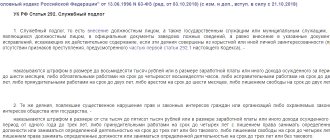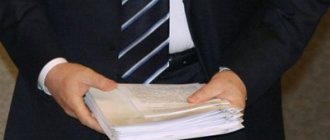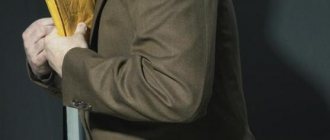How is this crime classified?
Dear readers!
Our articles talk about typical ways to resolve legal issues, but each case is unique. If you want to find out how to solve your particular problem, call: 8 Moscow8 St. Petersburg
or if it’s more convenient for you, use the online consultant form!
All consultations with lawyers are free.
Forgery, as a rule, occurs with the intention of concealing material waste, falsifying reporting documentation or theft of financial resources.
The main subject of the crime will be considered official documents that legally certify significant facts or events that have occurred, the falsification of which can lead to certain consequences in violation of the rights of citizens, municipal organizations or the state as a whole.
The subject of a crime can include not only distorted documents, but also those created for the first time (work records, education diplomas, sick leave certificates, etc.)
Limitation periods for criminal prosecution
The statute of limitations for a crime is a certain period of time after which, subject to certain legal conditions, a person will no longer be held criminally liable.
The latest edition of the Criminal Code of the Russian Federation provides for the following deadlines:
- two years for acts of minor gravity;
- six years for acts of average gravity;
- ten years for serious acts;
- fifteen years for crimes of special gravity.
The period of the crime begins on the next day and continues until a lawful verdict is rendered. However, as a rule, this does not mean that you can commit an offense and sit out. Article 78 also applies to abuse of power and forgery. The only thing that these articles may not provide for is mass crimes against society. There is a stipulated list of those crimes that do not include a statute of limitations. These include acts of terrorism, genocide, war and environmental crimes.
All other crimes may provide for the beginning and end of the period of criminal prosecution, in particular, crimes for all approx. Article 292, which is what we are talking about, but the statute of limitations will vary depending on the severity.
Arbitrage practice
Severe sentences involving imprisonment and imprisonment are rarely imposed.
Arrest, as a preventive measure, is ordered by the court if official forgery is committed along with other offenses falling under the Criminal Code.
At the same time, punishment in the form of imprisonment cannot be imposed on pregnant women and women with children under 14 years of age.
Please note: acquittal court decisions can be made in cases where the actions of the subject did not have unlawful intent.
Even if authority was exceeded and corrections were made to the papers in order to prevent actual damage and avoid harmful consequences, then these actions can be classified as extreme necessity and the impossibility of doing otherwise. In such cases, the investigation reports the absence of direct intent and removes the prosecution under Art. 292.
Is there criminal liability for official forgery? See the specialist’s comments in the following video:
Article 292 part 1 – comments
Each criminal offense has an object, a subject, as well as their corresponding parties. However, regardless of what article the accused will be charged with, if even one such component is not found in his actions, then he will escape punishment due to the fact that the crime will not be proven.
From an objective point of view, the forgery itself may consist of two actions performed at the same time or in some other way:
- drawing up initially false official papers;
- entering into prepared documents changes that change their essence.
Such documents can be represented by a diploma, work book, regulatory act, sick leave, etc.
If the corpus delicti is incomplete, punishment will most likely not follow.
Thus, the subject of the offense may not be a document that has already existed for some time, but also one that has just been issued, confirming a legal fact and having legal consequences (such as a diploma or work book).
It is important! SP can occur not only with documents coming from a certain organization or person to the official’s workplace, but also with other papers submitted to him for consideration.
The crime is considered completed after the commission of illegal acts with official documents. In this case, the legislation will not take into account whether these documents will be applied somewhere.
Only government employees can bear criminal liability for official forgery. institutions or officials. Ordinary citizens and employees of organizations are not held accountable on this issue.
Only civil servants and officials can be punished for forgery
Such offenses are committed only with selfish intent.
Note ! In another situation, if evidence of an unintentional act is collected, the investigation is able to reclassify such an action as negligence, manifested due to negligence when filling out a document, which has nothing to do with direct intent.
What is the punishment for defaming a person under the article of the Criminal Code of the Russian Federation?
Defaming an innocent person can also be subject to criminal prosecution. The work of law enforcement agencies is often not limited to collecting evidence, drawing up a report and executing a sentence. Sometimes innocent people suffer because of slander and false reports.
Therefore, the Criminal Code provides for punishment under the article of libel, which:
- Defames the reputation and good name of an innocent person.
- Dooms a person to unlawful criminal punishment.
- Violates the humanistic principles of freedom and property.
Typically, in serious cases, the punishment under this article can be imprisonment for a term of three to six years. Since slander is a kind of false testimony, the punishment here is similar. Sometimes slander is accompanied by falsification of evidence, which is a forgery and is punishable by law.
The classification is based on the second part of Article 292, since forgery with the aim of misleading investigators often entails grave consequences for life, health and human rights. By way of clarification, we can cite an example where, due to the actions of officials, people who had nothing to do with the offense suffered and were deprived of the right to freedom or property.
However, such points still need to be proven in court.
Sanction Art. 292 of the Criminal Code of the Russian Federation
Punishments and sanctions are provided for any crime. These penalties depend on the severity of the offense. For example, such acts as diploma forgery, or falsification of the results of a medical examination or medical examination entail serious consequences.
After numerous changes in the field of the Criminal Code, regulatory documents, reports and dissertations, a stable system of punishments for various crimes has been formed in the legislation. What responsibility awaits criminals under Article 292?
Part one of the above article suggests the following:
- A fine of up to 80 thousand rubles or 6 months’ salary of the perpetrator, and the fine can be imposed on both official salary and unofficial income, which can be proven.
- During free time from work, additional compulsory work of up to 480 hours may be established.
- Correctional labor for up to two years (can be carried out at the place of work or in any other organization).
- Occasionally, forced labor may be imposed for a period of up to two years.
- Arrest for up to 6 months (does not apply to minors, pregnant women and women with children under 14 years of age).
- If the forgery caused serious financial losses and was committed together with another crime, for example, embezzlement, then imprisonment for up to two years may be imposed.
The first part is more aimed at non-serious acts.
Part two includes more stringent measures:
- a fine in the amount of 100 – 500 thousand, or in the amount of the convicted person’s salary for 1-3 years;
- imprisonment for a term of up to 4 years of imprisonment, or forced labor for a term of up to 4 years. This penalty may also include a three-year ban on certain activities.
A ban on carrying out activities may not be applied; this issue is resolved at the discretion of the court.
Legal regulation and responsibility for official forgery
Russian legislation provides for criminal liability for official forgery. Possible penalties are prescribed in Art. 292. Criminal Code. This may be a fine; forced, compulsory or correctional labor or a real term in the form of imprisonment.
Official forgery can threaten an official:
- a fine of up to 80 thousand rubles. or in the amount of salary or other income for a period of up to 6 months;
- compulsory work up to 480 hours;
- correctional labor for up to 2 years;
- forced labor for up to 2 years;
- arrest for up to 6 months or imprisonment for up to 2 years.
Aggravating circumstances include the commission of an act that entailed a violation of the rights and legitimate interests of citizens, organizations, society or the state.
According to Part 2 of Art. 292 liability is more stringent, since the elements of the crime are considered more socially dangerous:
- fine from 100 to 500 thousand rubles. or in the amount of salary or other income for a period of 1 to 3 years;
- forced labor for up to 4 years with or without deprivation of the right to hold certain positions or engage in certain activities for a period of up to 3 years;
- imprisonment for up to 4 years with or without deprivation of the right to hold certain positions or engage in certain activities for a period of up to 3 years.
To bring a person to justice under Part 2 of Article 292, the prosecutor must prove the existence of a cause-and-effect relationship between the committed act and its consequences.
The criminal will compensate for damage to the victim’s health with his property
Not long ago, the Crime Victims Support Fund proposed seizing the property of the accused during the investigation. This proposal aims to compensate for the damage caused by the offender. In the latest edition of Article 160.1 of the Code of Criminal Procedure, this innovation was taken into account. Any damage can now be compensated financially at the expense of the defendant’s property, be it the negligence of a manager or employee whose actions caused people to suffer, or a crime of a higher degree of gravity, for example, murder.
Concealing or falsifying information also entails material losses and falls under this category. The subject of arrest is the authorized bodies. Our country, however, is reluctant to get along with this innovation. The fact is that in practice we have to deal with damage that is difficult to calculate and prove.
For example, the court is very picky about the concept of moral damage, which means:
- Thorough psychological examination.
- Availability of medical certificates.
The amount of moral compensation should be paid not only according to the established amounts. Moral compensation also aims to cover the costs of doctors, the consequences of the crime and some social costs.
With amendments to the Code of Criminal Procedure, the Ministry of Justice will protect company computers from being seized by investigators
In February 2022, the Ministry of Justice prepared a bill to amend Articles 164 and 177 of the Criminal Procedure Code of the Russian Federation. The essence of the changes is to introduce restrictions on the seizure of computer equipment by law enforcement officers from private enterprises. This is justified by the fact that the investigation process should not negatively affect legitimate business.
This is a deliberate step towards improving the criminal system in the field of business activities, so that one does not interfere with the other.
And it can hinder business:
- seizure of electronic media;
- reputation arising as a result of a crime;
- arrests, searches or interrogations.
Legislation tries to regulate this area so that legal entities, private organizations and individual entrepreneurs in general suffer as little as possible due to criminals, crimes and criminal prosecution associated with these unpleasant facts. Law enforcement agencies have the right to obtain the necessary information, but this must be done in such a way that the progress of the investigation does not negatively affect the company’s activities.
In February 2022, there was a public discussion of the amendments of the Ministry of Justice, after which they were introduced into the legislation and the Code of Criminal Procedure of the Russian Federation.
Comments to Art. 292
Comments will help you understand in detail such an illegal act as forgery, its composition and types of this crime. Article 292 of the Criminal Code of the Russian Federation (official forgery) with comments should first of all be studied by people suspected and accused of committing this illegal act.
The comments to the article contain a detailed analysis of the crime:
- The object of the illegal action is the work of government bodies directly related to the flow of documents, as well as their release.
- The subject of the illegal action is official papers. These include documents emanating from a specific organization or government agency and having legal force. A document that has signs of publicity is official and has legal force. This is expressed in the presence of a generally accepted, possibly at the legislative level, form. It is addressed to an indefinite number of people and is recorded materially, for example, on paper or electronic media.
An official document is vested with legal force from the moment it is signed by a person entitled to perform such an action. In simple words that have the right to sign.
- To accurately understand the meaning of the concept of “official document”, you need to refer to the Federal Law No. 149 of July 27, 2006 and the unified Rules for the preparation of such papers, approved by the Presidential Decree of January 20, 1994. These regulations determine the procedure for creating and signing documents by officials persons. Often, checks, receipts, warranty cards, etc. are considered official documents. They are not such, since on the one hand they are not inherently public, and on the other hand they are not signed by competent officials. All of the above are internal documents of the organization. These papers cannot act as the subject of official forgery.
- From the objective side, forgery has a formal composition. It ends when an official document contains information that is obviously unreliable for the attacker. The use of a false document and the consequences caused by this action go beyond the scope of the criminal act in question. They are not included in the subject of proof. The use of false documents is often a crime related to official forgery. The qualification element of a criminal act provided for in Article 292 of the Criminal Code of the Russian Federation is its commission, which entailed significant violations of the rights and interests of individuals and legal entities, as well as society and the state.
- The subjective side of the unlawful act in question is characterized by the presence of guilt in the form of direct intent. The person is aware of the illegality of his actions and wants them to happen. According to Part 2 of the commented article, the perpetrator seeks to significantly violate the interests of citizens, legal entities, the state and society as a whole. The mental attitude towards the fraud being committed must necessarily be associated with the presence of selfish motives or other interest. Self-interest is expressed in the desire to benefit for oneself. The benefit can be tangible or intangible. Material is characterized by the desire to obtain rights to any property, intangible – to dispose of objects of intellectual property. The wording “other interest” includes an unlimited list of the official’s motives, for example, the opportunity to obtain a promotion, sick vanity, protectionism, or concealing an unsuccessful work result.
The subject of the unlawful act specified in Art. 292 of the Criminal Code of the Russian Federation (forgery of documents) may be an official, state or municipal employee who has a time frame for the performance of his duties. Fraud may be associated with a person’s temporary or permanent tenure in a specific position.
Material and intellectual fraud
The Zheleznodorozhny District Court of Novosibirsk was prosecuting a criminal case accusing citizen Sh. of committing a crime under Part 1 of Art. 282 of the Criminal Code of the Russian Federation.
The Investigative Committee authorities charged Sh. with actions aimed at inciting hatred or enmity, as well as humiliating the dignity of a person or group of persons on the basis of race, nationality, attitude to religion, membership in any social group, expressed in dissemination through the Internet » videos and text materials of an extremist nature. This vague wording is taken verbatim from the indictment.
According to investigators, on his page on the social network VKontakte, Sh. posted videos and text materials classified as extremist.
The criminal case was initiated in July 2013. The preliminary investigation lasted for more than a year, and the case was considered by the court for almost three years.
The acquittal based on the results of the trial was issued twice - in August 2016 (it was overturned by the appellate court, the criminal case was sent for a new trial) and on May 25, 2022.
I defended Sh. during the preliminary investigation and trial.
The main evidence on the basis of which all subsequent accusations were based was the documentary evidence provided by the investigation of the fact that the specified information was posted on the Internet - an act of inspecting a page on a social network with printed attachments and a CD.
The remaining evidence was either derivative of this act (conclusion based on the results of a psychological and linguistic examination), or did not confirm the very fact of posting extremist materials on the Internet (for example, a protocol for examining the system unit of Sh.’s computer).
It was found that the annexes to the act, which should carry evidentiary content, were falsified and bore signs of both material and intellectual forgery. In the printed application, several dozen pages were mechanically cut off from the bottom to hide the IP address and date on them. On one of the pages, which turned out to be printed in landscape orientation, the deleted data was preserved because it was sewn under the cover of the file. A visual inspection of this page revealed a date that did not coincide with the date of the inspection indicated in the report.
According to the conclusion and testimony of a specialist in court, these attachments could not be printed under the conditions shown in the inspection report.
The CD presented as an attachment to the inspection report was marked with a different date and time of recording than indicated in the report. In addition, the videos on the disk had different computer formats than those reflected in the act, and the names and duration of playback of the files differed. Moreover, there was another version of the CD, which differed from this disk at least in the composition of the files, disappeared to an unknown location and was never included in the criminal case.
The fact of forgery of the CD was confirmed, among other things, by the testimony of specialists questioned in court who conducted an expert psychological and linguistic study during the preliminary investigation.
In addition, the defense revealed a fact, which was later recognized by the court as established, that one of the sheets of the appendix to the inspection report of the system unit seized from Sh.’s home was a “foreign sheet”, since it was not an image of the desktop of the office computer on which the work was carried out. specified inspection.
The specialist who inspected the system unit, during the interrogation at the court hearing, was unable to clearly explain this fact, suggesting that the mentioned sheet was included in the attachment by accident from a procedural document in another case.
The specified inspection protocol of the system unit was recognized by the court as inadmissible evidence.
The court also recognized as inadmissible evidence the so-called Internet inspection report, drawn up at a later time by an operational officer, in order to record the activity of the page user. This act was not signed by the person who compiled it, and a person under the age of majority was involved as a representative of the public, which was also identified by the defense with certain difficulties, since the dates of birth of the persons involved were not reflected in the protocol.
Thus, there was no evidence, with the exception of falsified evidence, that could confirm the fact that my client Sh. posted extremist materials on the Internet.
The court of first instance pronounced an acquittal against Sh. The state prosecutor filed an appeal against him, but on July 19, 2022, based on the results of the consideration of the criminal case by the Novosibirsk Regional Court, the verdict against Sh. was left unchanged and entered into legal force.
Another commentary on Article 292 of the Criminal Code of the Russian Federation
1. The object of this crime is the normal activities of government bodies related to the circulation and release of official documents into circulation.
2. As the subject of this crime, official documents are used, which include those that come from a certain legal entity (not necessarily from a government body) and contain all the features of an official document, i.e. recognized by law. An official document is one that has the attribute of publicity. This is expressed in the fact that the document has a generally accepted form, is addressed to an indefinite range of subjects of legal relations and is recorded on a material storage medium (paper, magnetic and electronic media, etc.). An official document acquires legal force from the moment it is signed by an official who has the right to sign (the right to sign).
Of great importance for the full disclosure of the concept of “official document” are: Federal Law of July 27, 2006 N 149-FZ “On Information, Information Technologies and Information Protection”, Unified Rules for the Preparation of Official Documents, approved by the Decree of the President of the Russian Federation of January 20, 1994. “On the fundamentals of state policy in the field of informatization” (ed.
dated July 9, 1997) (Collection of Acts of the President and Government of the Russian Federation. 1994. N 4. Art. 305), which determine the basic provisions and procedure for drawing up and signing documents by officials of state bodies.
Receipts for goods, receipts, warranty cards for household appliances are not considered official documents, since they do not have the above characteristics (publicity, signing by a competent official). They are documents for internal use of commercial organizations and cannot be considered as the subject of official forgery.
3. From the objective side, official forgery is formal and complete from the moment knowingly false information is entered into official documents, as well as corrections are made to said documents that distort their actual content. The use of a forged document, as well as the consequences caused by it, are beyond the scope of the crime in question and are not included in the subject of proof. All further actions related to the use of a forged document and their consequences can be assessed as involving the commission of two or more crimes and are subject to legal assessment through the prism of complicity or a combination of crimes.
A qualified element of this crime is the commission of an act that entailed a significant violation of the rights and legitimate interests of citizens or organizations or legally protected interests of society or the state (see commentary to Article 285 of the Criminal Code).
4. The subjective side of official forgery is characterized by guilt in the form of direct intent, in which the person is aware of the unlawful nature of the act and wishes to commit it. According to Part 2, the subject additionally strives for a significant violation of the legally protected interests of citizens, society and the state as a material consequence, and in this case must foresee these consequences.
The mental attitude of an official towards forgery must necessarily be associated with the presence of selfish or other personal interest. Self-interest is expressed in the desire to benefit for oneself. This benefit can be material (the right to property) or intangible (the right to dispose of certain objects of intellectual property). The legislative formula “other personal interest” implies a fairly wide range of motives of an official: careerist goals, sick vanity, protectionism, concealing the unfavorable results of one’s official activities, etc.
5. The subject of the crime is special. Officials, state or municipal employees who have a certain time frame for the exercise of their official and official powers and perform certain functions are subject to liability. The commission of forgery must be associated with the permanent or temporary stay of the person in the relevant position.
Official forgery: concept and features
Fraud usually refers to creating a false picture and misleading people by adjusting data or preparing false objects, documents or statistics. The Criminal Code defines official forgery as the entry by a person into official documents:
Dear readers! To solve your specific problem, call the hotline or visit the website. It's free. 8 (800) 350-31-84
- false information (knowingly);
- corrections.
Such edits must distort the actual content of the document. When committing an illegal act, there must be a selfish or personal interest of the offender in committing the forgery. The absence of direct intent does not allow the crime to be classified as forgery. Here we can only talk about negligence, when errors got into the documents due to carelessness.
If the harm from official forgery turned out to be less than if the person had not entered false information into official documents, then there will be no crime in this case.
Official documents can be quarterly reports, legislation, sick leave, work books, etc. This document must be public and recorded on a specific material medium: electronic, paper or magnetic form. The document must contain the signature of an official or civil servant. In this case, the document itself must be authentic and have legal force.
The subject of the crime may be an official, state or municipal employee. Ordinary citizens and employees of private companies are not responsible for this act.
In practice, official forgery is often associated with other crimes. For example, it is often committed to hide the fact of embezzlement of public funds or their misuse. But the offender may also be driven by a banal desire to hide his incompetence or embellish the state of affairs.
The crime is considered completed after the commission of illegal actions with the documentation. The fact of using an official document does not matter to the court. Thus, official forgery is a crime with formal elements.
Criminal legislation also contains punishment for falsification of evidence (under Article 303 of the Criminal Code of the Russian Federation). It should be distinguished from forgery.
In turn, it is official forgery that is a general criminal norm, since it covers all cases of falsification of official documents. Whereas with falsification we are talking only about the distortion of factual data.
Another commentary on Article 292.1 of the Criminal Code of the Russian Federation
1. The object of this crime is the normal functioning of government bodies, local self-government bodies, whose powers include activities related to the implementation of tasks related to the registration of citizenship through the issuance of passports of citizens of the Russian Federation.
2. The objective side is characterized by the person committing actions directly related to the issuance of a passport, contrary to the grounds established by the legislation of the Russian Federation. The composition is formal in design
It is important to know that the persons receiving an illegal passport must be a foreign citizen or a stateless person. It is also criminally punishable for a person authorized to do so to enter knowingly false information into documents that resulted in the illegal acquisition of citizenship of the Russian Federation.
This content has some similarities with official forgery. Their main difference lies in the very subject of the crime, which, when committing this crime, is the passport of a citizen of the Russian Federation. In case of forgery, the subject can be a fairly wide range of official documents. This composition is special in relation to forgery.
3. The subjective side of the crime under Part 1 of the article under comment is characterized by the presence of only an intentional form of guilt. At the same time, the culprit is aware of the unlawful nature of his behavior, aimed at the illegal issuance of a passport of the Russian Federation with the subsequent acquisition by the person of citizenship of the Russian Federation, and wishes to carry out these actions.
As for h
2 of this norm, then the content of guilt is characterized by negligence, or, to a greater extent, negligence. In this case, we are talking about special negligence of an official related to the issuance of passports or the preparation of documents for their issuance
Additional qualifications under Art. 293 of the Criminal Code is not required.
4. Special subject - a person who performs the functions of an official or state or municipal employee related to the issuance of passports or the preparation of documents for their issuance.
Kinds
SP can be represented by such actions.
| View | Description |
| Intellectual forgery | It is a crime when false information is entered into an official document, which is obviously inconsistent with real events and facts, thereby violating its authenticity and originality. The same applies to the designation of incorrect details (entering a date that is not linked to the actual day of registration of the document and affixing a fake signature). |
| Material forgery | Correction of official papers, changing its real essence. Such changes may involve partial deletion of data, which may change the meaning of all information contained in the document. Methods of change can include adding to the original text, erasing it, verifying it with a different number, adding inscriptions, etc. |
There are several types of official forgery
Official forgery can occur in a situation where a change in the false nature of information in a document is associated with the work actions of the guilty employee. In other words, forgery is associated with the performance of work functions. In the case when a responsible person in the civil service performs similar actions, but not related to his work duties, then there is no corpus delicti for this crime.
Note ! Official forgery is characterized by direct intent or the presence of a special reason - in the form of self-interest or another motive. A crime under the joint venture is considered committed from the moment false information or distorted facts are entered into a document, which change the essence of its content, regardless of whether this document is subsequently corrected.
When studying this document, you need to take into account that the entry of false testimony into official papers that serve as the basis for issuing citizenship (or a residence permit), the committed act is considered under Article 292 Part 1 of the Criminal Code of the Russian Federation and contains two types of crime.
- Illegal issuance by a responsible person or civil servant of a Russian passport to a citizen of another state or a person who does not have Russian citizenship.
- The entry of false information into documents by a responsible person or civil servant, which allowed an outsider to acquire Russian citizenship under illegal circumstances.
As a rule, official forgery assumes direct intent
These illegal actions, which made it possible to illegally issue citizenship or a passport to strangers, constitute the crime.
Important! In the concept of SP, legislation includes the entry by a civil servant or responsible person of previously known incorrect data (the same as “cleaning of documents”), which changes the real meaning. Such actions must be committed out of self-interest or personal interest.
Article 292 Part 2 also stipulates a more risky type of offense - official forgery, entailing a violation of civil, public and state rights.
Forgery can also be combined with other criminal offenses. For example, to write off embezzlement and so on. At the same time, it is not only necessary to pay great attention to the division of criminal acts, but also to attach importance to qualifying characteristics.
Article 292 of the Criminal Code of the Russian Federation
What else you need to know about official forgery
Laws and articles cannot completely determine the course of human life, therefore there are significant exceptions to many rules. It also happens that a person commits an act under the pressure of external circumstances and/or in order to avoid more dangerous consequences. In short, it acts only when absolutely necessary. In this case, the person who committed the act will not be accused.
The criminal system of the Russian Federation is evolving. Referring to Lebedev’s large-scale and detailed commentary on the Criminal Code of the Russian Federation, without which not a single course project on law can be completed today, it can be noted that the Criminal Code of the Russian Federation pursues many universal principles, therefore it should strive for justice, and not for dry compliance with legislative documents.
One example of these principles is the fact that officials must have certain powers in order to be responsible for a crime. In any area, be it medicine, public service or any other area where illegal forgery can cause harm, there must be a person held accountable under this article. Every year a new commentary on this topic or corrections and additions to the Criminal Code itself is published. This is something you need to keep an eye on to stay informed.
Judicial practice on official forgery
In Russian and foreign practice, there are not many real cases where forgery was misleading and brought serious consequences. Basically, many acts were recognized as the result of the carelessness of officials, or simply did not entail official consequences. And yet, such things do happen.
For example, citizen Z. worked on a state farm as a chief engineer. He had the power to issue orders, and with the help of this ability he appropriated the property of the organization. As a result, he was accused of official forgery. However, there are some nuances here. The district court did indeed issue a conviction, but only under the article of fraud. The fact is that the state farm is not a state organization, and citizen Z. is not an official. Based on this, the actions of the accused cannot be qualified as official forgery.
In many other exceptions, other nuances may arise.
For example, the documents that were the subject of corporate malfeasance were not official at all or, if it could be proven, the misrepresentation was human error rather than an act of corruption or attempted deception.
FAQ
Can the absence of official papers serve as signs of forgery, for example, if they are lost, confiscated or do not correspond to their serial numbers?
If we talk specifically about your interpretation of the question, then no, it is not. Forgery means investing something in place of what is required, and not the complete absence of an object (document). The absence of official papers may be a consequence of the official’s negligence. However, the information provided is not enough to give a precise answer to the question.
Is it possible to start a criminal trial if there is evidence of official forgery and falsification of information, but the offender is unknown?
To initiate a criminal case, it is necessary to determine the elements of the offense, which includes the subject of the offense (in other words, the culprit). But during the investigation, examinations may be used. Employees who had access to papers in which false information was entered may be identified as suspects.
According to Article 140 Part 2, in order to set the criminal process in motion, it is necessary to have sufficient facts confirming the elements of the crime. In order to initiate an investigation, you do not need to have information about who the offender is. All that is needed is information confirming that a crime has been committed.
Note ! The criminal process is initiated to ensure that a crime has actually been committed, but there must be precise indications of both the offense itself and its criminal nature.
Sometimes the offender may be unknown
If a man was convicted of SP under Article 292 of the Criminal Code, does his own son have the right to ever hold the position of assistant magistrate?
If we follow the saying that children are not responsible for their parents, then the children of convicts can work as anyone. There is no law that relatives are responsible for the actions of their loved ones. Therefore, it is impossible to prohibit them from working in certain jobs or holding special positions.
In 2001, a criminal trial was initiated under the article on official forgery, but it was immediately closed due to an amnesty - literally on the same day. Are there any restrictions on the right to work as a teacher?
If, due to an amnesty, a criminal’s criminal record has been cleared, there can be no restrictions. However, if the criminal record has not been cleared, then the former convict may be allowed to work in his specialty if the commission on juvenile affairs gives the go-ahead. This rule is spelled out in Article 331 of the Labor Code of the Russian Federation.
If a criminal record is cleared, a person can work anywhere
Will it be a forgery using his official position if the judge allowed time to correct the shortcomings of the statement of claim? This application was filed within the period established by law, but the judge made a refusal 5 days later, commenting on the refusal by saying that the plaintiff was unable to file a claim within the period specified by law. However, later the same correction was added to the case by a new judge.
As a lawyer, I see no connection with forgery when using one's official position. The question arises as to whether a covering letter was attached to the revised statement of claim and whether an indication was made that this claim was sent as a response to the decision to leave the statement of claim without consideration? Most likely, the revised claim was accepted as a new one, and the other one was returned due to the fact that the shortcomings were not eliminated.
Note ! In the process of transforming the most important spheres of life in modern society, a large role is assigned to law enforcement agencies, executive and judicial authorities. Therefore, criminal acts within the law enforcement environment and government agencies themselves are especially dangerous and need to be eradicated.
However, professional and organized crime has long attacked government structures and civil service at all levels of government. Many employees and workers have been subject to criminal influence, which interferes with the normal functioning of authorities and management. This undermines the authority of the authorities in the eyes of the public, which is why it often disrupts and slows down large-scale events at all levels. In this regard, malfeasance should not be allowed, and employees who take advantage of their official position should be punished to the fullest extent of the law.










